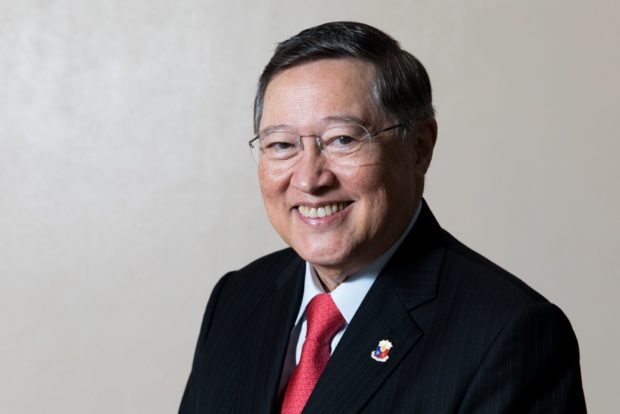DOF: P1.01B daily underspending in Q1 due to reenacted budget

Finance Secretary Carlos G. Dominguez III. (Photo from the Department of Finance)
MANILA, Philippines — The government was unable to spend more than P1 billion per day on public goods and services as it had ought to during the first quarter due to the budget impasse in Congress, according to the head of the Duterte administration’s economic team.
Given that the government underspent as it operated using a reenacted 2018 budget at the start of the year, Finance Secretary Carlos G. Dominguez III told beat reporters on Viber that the below-program expenditures would “definitely be a drag on growth.”
It was only last week when President Rodrigo Duterte finally signed the P3.7-trillion 2019 national budget, even as he vetoed P95.3 billion in projects that were not included in his administration’s priorities.
This year’s budget had stalled in Congress amid alleged unauthorized insertions by the House of Representatives.
The government will release the first-quarter gross domestic product (GDP) growth figure in May, but Socioeconomic Planning Secretary Ernesto M. Pernia, the country’s chief economist, already told the INQUIRER last week that economic expansion could have had slowed to 6 percent — the lower end of the full-year target — during the January-to-March period.
The Philippines’ GDP grew 6.6 percent in the first quarter of last year and 6.3 percent in the fourth quarter of 2018.
Last month, the Cabinet-level interagency Development Budget Coordination Committee (DBCC) cut its 2019 growth goal to 6-7 percent from 7-8 percent previously partly due to the budget delay.
Citing a report from National Treasurer Rosalia V. de Leon during Holy Week, Dominguez said the cumulative budget deficit in the first quarter amounted only P90.2 billion, 41-percent percent narrower than the P152.2-billion deficit posted during the same three-month period last year.
The government had programmed a first-quarter budget deficit of P188.4 billion—as such, the actual gap was 52-percent below the program.
For the entire 2019, the DBCC had capped the budget-deficit program with a wider ceiling equivalent to 3.2 percent of GDP or P624.4 billion as the government wanted to build more infrastructure and finance the Duterte administration’s priority programs and projects this year.
A budget deficit meant that the government intended to spend more than the amount of tax and non-tax revenues it had targeted to collect.
From January to March, public expenditures reached P777.9 billion, 11-percent lower than the P876.3-billion program.
Compared with last year’s end-March disbursements, government spending inched up by only 1 percent, equivalent to an increment of just a little over P6 billion.
“Looks like we didn’t spend a bit over P1 billion a day against program,” Dominguez said, as P98.3 billion that should have been used for the government’s priority programs and projects were not disbursed given a reenacted budget.
Based on the Bureau of the Treasury’s estimates, daily underspending for primary expenditures — disbursements that did not include interest payments for outstanding liabilities — hit P1.01 billion during the first quarter, de Leon said.
The Treasury nonetheless recorded P7.3 billion in interest payment savings as of March, she said.
Meanwhile, combined tax and non-tax revenues of P687.7 billion in the first three months were also behind target, although by a mere P200 million or 0.03 percent.
Year-on-year, total revenues climbed 11 percent from P619.8 billion a year ago as both tax and non-tax collections increased.
De Leon told Dominguez that the collections of the bureaus of Internal Revenue (BIR) and of Customs (BOC) — the country’s two biggest revenue agencies — grew 11 percent and 9 percent, respectively, during the January to March period.
Also, “non-tax [revenues] rose by 18 percent with higher dividends from remittances from BSP [the Bangko Sentral ng Pilipinas] and PDIC [the state-run Philippine Deposit Insurance Corp.] totaling P8.6 billion,” de Leon added.
During the month of March alone, the national government registered a budget deficit of P58.4 billion, 51-percent below the programmed P119.4 billion and 47-percent lower year-on-year.
Expenditures in March reached P287.3 billion, 16-percent below program and down 8 percent from a year ago.
On the other hand, last month’s revenue collections jumped 13 percent year-on-year to P228.9 billion, exceeding the program by 3 percent.
To offset the delay in implementation of the 2019 budget, Pernia, who heads the state planning agency National Economic and Development Authority (Neda), last week sought work on new infrastructure projects for 24 hours a day, seven days a week.
/atm
